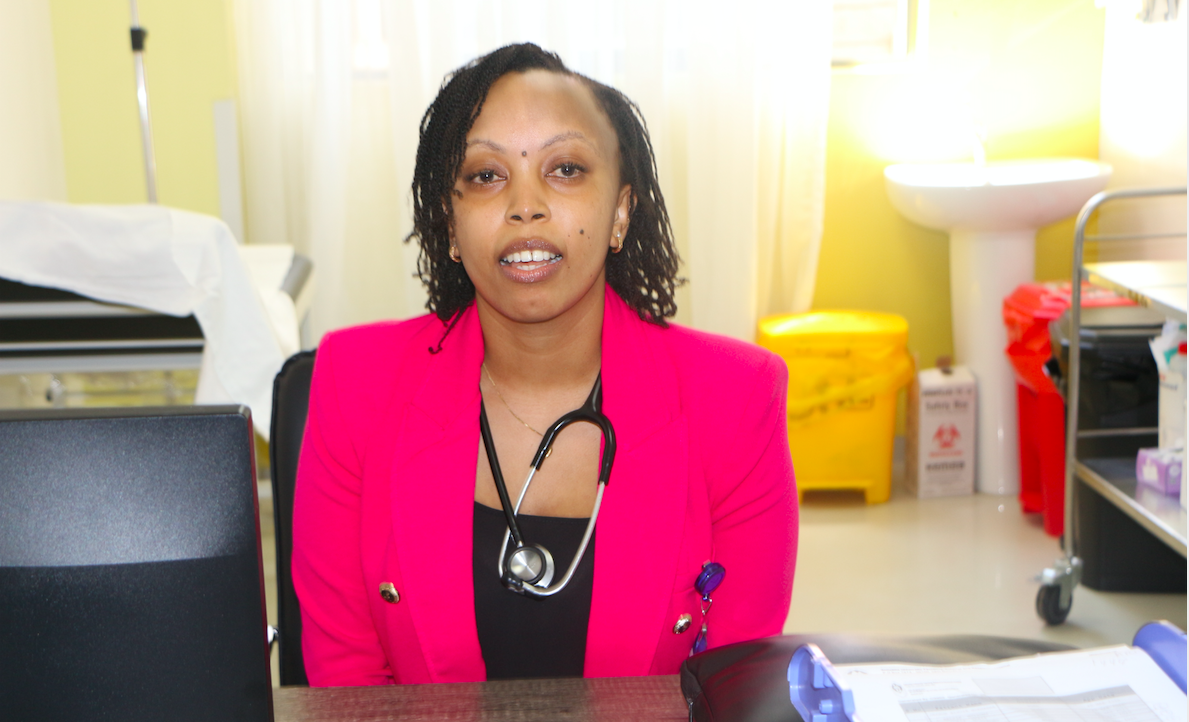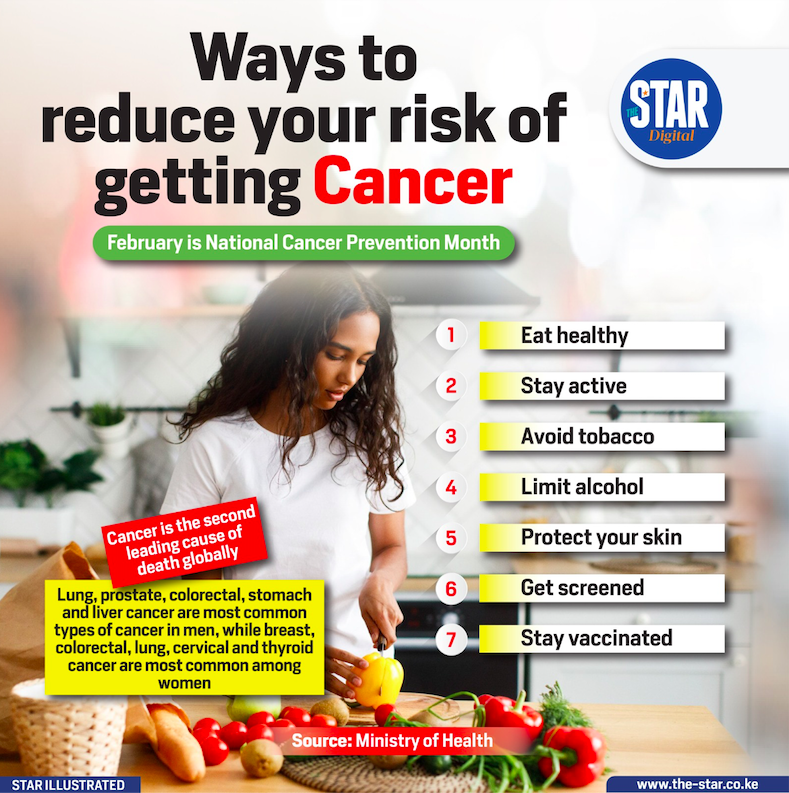 Dr Caroline Tonio is one of the youngest
oncologists in Kenya.
Dr Caroline Tonio is one of the youngest
oncologists in Kenya.
The median age of oncologists (doctors who specialise in cancer) in Africa, including those in Kenya, was 51 years in 2019 according to study on cancercare workforce in Africa. They were also more likely to be male.
The situation gets more troubling for Kenya, where about 44,000 people are newly diagnosed with cancer every year. The National Cancer Institute says Kenya had only 60 oncologists serving 54 million Kenyans in 2022.
But there are new kids on the block to replace the ageing practitioners. CAROLINE TONIO, 35, is one of the youngest oncologists in Kenya mentored by veteran Prof Nicholas Abinya before he retired in 2020 from the University of Nairobi. She is currently based at the Kenyatta University Teaching, Referral & Research Hospital (KUTRRH). Dr Tonio is preparing to leave for the UK for a fellowship in clinical research. Her goal is to strengthen cancer-specific clinical trials when she returns to Kenya after 12 months.
She spoke to Star’s John Muchangi.
So, how long have you practice as a medical doctor?
I’ve been in practice since I graduated with a Bachelor of Medicine and Bachelor of Surgery (MBChB) degree in 2012, then completed an internship in 2013. So I’d say at least about 12 years of practice. But specifically in oncology, I started about five years ago.
What was the process before starting your oncology practice?
So first you do your undergraduate, then a postgraduate degree in internal medicine (at University of Nairobi KNH Campus), which takes three years. After that, you do a fellowship in medical oncology, which is two more years. So, it’s a long journey.
You mention ‘medical oncology.’ What are other fields of oncology?
Oncology has a few branches. There’s medical oncology, which focuses on systemic treatments –chemotherapy, targeted therapies, immunotherapy. Then there are radiation oncologists, also called clinical oncologists, who mainly deal with radiotherapy but also have some background in systemic treatment. And then there are hemato-oncologists who focus on blood cancers and blood-related disorders.
So, as medical oncologists, we typically handle
both solid tumors and blood cancers, especially because we don’t have enough
hemato-oncologists in Kenya. But our work is mainly on systemic treatment. We don’t do radiation.
Why did you choose oncology? Is it more profitable?
Haha, money is subjective. You can make money anywhere if you're good at what you do. For me, the interest started when I began working with a medical oncologist during my time as a general practitioner. At the time, I was just looking for extra income, really. But that’s when I got exposed to oncology. This was before my Master’s, because in undergraduate we had almost no oncology exposure.
So I developed an interest. I enjoyed seeing
patients gain hope, especially when we achieved good outcomes and improved
their quality of life. That experience made me want to explore the field
further. It’s also such an evolving field. There's constant research, every day there’s something new, a new treatment or
intervention.
In which hospitals did you work then?
I worked as a private doctor under Dr Gladwell Kiarie. She’s actually one of my mentors and one of the pioneers of medical oncology in Kenya, especially among women. She runs a private practice, and we worked at Nairobi Hospital and MP Shah Hospital, mostly in private clinics.
Was there any oncology exposure during the internal medicine training?
A bit. There’s some interaction, but not much, because
oncology is a highly specialised field. We
had a short rotation in oncology, just a few weeks. But that helped reinforce
my interest. After that, I joined the oncology fellowship programme, which was relatively new, only about two or three years
old when I joined. That’s where I did two full years of oncology training.
What do you mean by a fellowship programme? Is it like being attached to an institution for hands-on learning?
Yes, a fellowship is sub-specialisation. You first specialise in something broad like internal medicine or gynecology, then sub-specialise in something narrower like medical oncology. It’s more like an apprenticeship, though it still includes coursework and a thesis since it’s a university programme.
You’re both dependent and independent. You manage
cases on your own but also have a mentor you report to, present cases to, and
learn from.
Who was your mentor?
My mentor was and still is Prof [Nicholas] Abinya.
He was the programme director and is now retired from
the university. He’s currently in private practice at Nairobi Hospital. He
founded the oncology fellowship programme and is considered the father of modern oncology in
Kenya.
 At least 44,000 Kenyans are diagnosed with different cancers every year.
At least 44,000 Kenyans are diagnosed with different cancers every year.
The most common cancers haven’t changed much. We still see the same top five: breast, cervical, colorectal, oesophageal, and prostate cancers (not in any particular order). But I’d say oesophageal cancer has increased significantly.
Five years ago, it wasn’t as common. Now it’s probably going to surpass prostate cancer in men and could be the third most common in women after cervical and breast cancer. There’s a lot of focus now on the so-called "oesophageal cancer belt." We’re also seeing increased research into upper Gastrointestinal (GI) cancers like oesophageal cancer, and there’s talk of developing proper screening programmes because, like many cancers, we still catch them very late.
Are patient outcomes improving?
Objectively, not really. If you look at data like Globocan, it’s about 50/50. For every 100 people diagnosed, about 50 survive beyond five years, and 50 don’t.
So survival is still poor?
Yes, outcomes are still poor. Most patients come to us very late, at advanced stages. They also often have other issues like malnutrition or comorbidities, which complicate treatment.
Malnutrition is especially common in gastrointestinal cancers, because patients physically can’t eat due to obstruction. Combined with other illnesses, it makes treatment harder and tolerance poorer. So yes, our outcomes are dismal.
What can change that?
Since we’re a referral centre, most of our patients come with an existing diagnosis. That means they’ve already been to other facilities, often for a long time, without a diagnosis. So by the time they reach us the disease is advanced.
At our level, we’re trying to change the situation by offering walk-in screening services for common cancers. For instance, we have a comprehensive breast clinic where any woman with a breast issue or lump can walk in without needing to start at a primary facility.
We’re also improving capacity in oesophageal cancer by enhancing our endoscopy services, which we hope to use as a screening tool in future. But most cancer care needs to start at the primary healthcare level, where people first seek help.
That’s where we should focus our resources –training and empowering healthcare workers to identify possible cancer cases early. There has been some training of clinical officers in oncology to build capacity at the primary level. It began with a specific goal but has expanded, and I believe that’s where the real change must begin.
We also heard you're taking up another fellowship.
Could you tell us more.
The foundation provided me with a grant, and The Christie will host me for 12 months. I’ll be rotating with their team, learning about how clinical trials are conducted, how they’re audited, and the regulatory processes involved.
One goal is to bring that knowledge back here and set up a clinical trials unit at Kenyatta University Hospital. While it exists in theory, it hasn’t picked up momentum yet.
The other goal is to build networks and attract collaborators, because clinical trials are expensive. We’ll need partnerships and support to establish and run them effectively.











